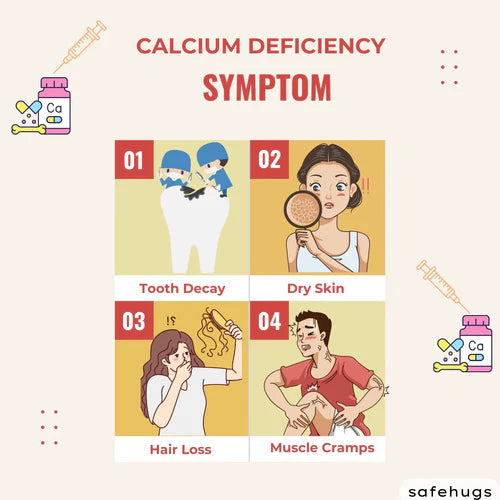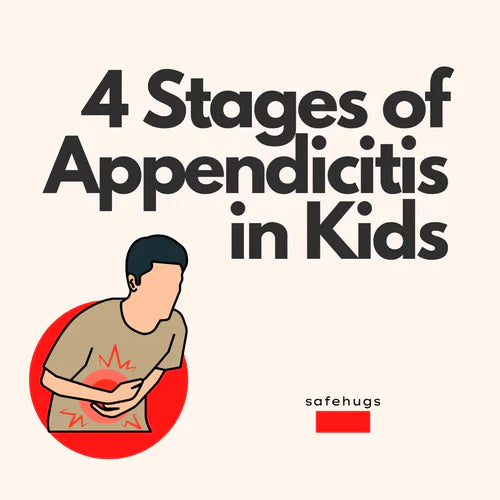Vitamin B12 Deficiency in Kids (Hindi, Telugu): Symptoms & Treatment

Why Is B12 Important?
Vitamin B12 is essential for kids as it supports healthy red blood cell production and prevents anemia. It plays a vital role in nerve development and helps maintain proper brain function, including memory and focus. B12 is also crucial for energy production, enabling kids to stay active and healthy. Additionally, it supports DNA synthesis, which is important for growth and cell repair. B12 deficiency in kids can cause fatigue, weakness, developmental delays, irritability, and nerve damage. Ensuring a diet rich in B12, through foods like meat, dairy, and fortified cereals, promotes overall development and prevents deficiency.
Vitamin B12 Benefits
- Boosts Energy Levels: Helps convert food into energy for overall vitality.
- Supports Red Blood Cell Formation: Prevents anemia by producing healthy red blood cells.
- Maintains Nerve Health: Protects and supports the function of the nervous system.
- Enhances Brain Function: Aids in memory, focus, and cognitive performance.
- DNA Production: Essential for creating and repairing DNA in cells.
- Supports Growth in Children: Crucial for proper growth, brain development, and overall health.
- Improves Mood: Plays a role in serotonin production, potentially improving mood.
- Essential During Pregnancy: Supports fetal brain and nervous system development.
Key Facts :
Ensuring adequate intake through foods like meat, fish, eggs, dairy, or supplements is key to reaping these benefits.
Vitamin B12 Deficiency Symptoms in Kids
Vitamin B12 deficiency can lead to a wide range of symptoms, which may develop gradually and worsen over time if left untreated. The symptoms can be categorized into physical, neurological, and psychological effects. Here are the key symptoms associated with vitamin B12 deficiency :
- Fatigue : Fatigue in kids due to B12 deficiency occurs because the vitamin is crucial for energy production and red blood cell formation. A lack of B12 can cause anemia, reducing oxygen delivery to tissues and leading to tiredness, weakness, and irritability. Ensuring a B12-rich diet or supplements helps combat fatigue and supports overall health.
- Pale or Yellow Skin : Pale or yellow skin in kids due to B12 deficiency occurs because the vitamin is vital for healthy red blood cell production. A lack of B12 can cause megaloblastic anemia, leading to pale skin and a jaundiced appearance from increased bilirubin levels. This happens when abnormal red blood cells break down faster than normal.
- Headaches : Headaches in kids due to B12 deficiency occur because the lack of red blood cells reduces oxygen delivery to the brain. This oxygen shortage can trigger frequent or persistent headaches. Additionally, low B12 levels may affect nerve health, contributing to neurological symptoms.
- Depressive symptoms : B12 deficiency in kids can lead to depressive symptoms such as irritability, mood swings, and feelings of sadness. This occurs due to the vitamin's role in nerve function and brain health. Ensuring adequate B12 intake can help improve mood and emotional well-being.
- Gastrointestinal issues : Gastrointestinal issues in kids due to B12 deficiency can include nausea, loss of appetite, and constipation. The deficiency can disrupt the digestive system, leading to discomfort and digestive problems. Ensuring adequate B12 intake through diet or supplements can help alleviate these issues.
- Difficulty Concentrating and Mental Impairment : B12 deficiency in kids can lead to difficulty concentrating, memory problems, and mental impairment. This occurs because B12 is essential for brain function and nerve health. Ensuring sufficient B12 intake can help improve focus and cognitive development.
- Pain and Inflammation of the Mouth and Tongue : B12 deficiency in kids can cause pain, inflammation, and a smooth, swollen tongue, often accompanied by a red or sore mouth. This can make it painful for children to eat or speak. The condition, known as glossitis, occurs because B12 is vital for maintaining healthy cells in the mouth and tongue. Proper B12 intake, through diet or supplements, can prevent and reduce this discomfort.
- Paresthesia in Hands and Feet : Paresthesia in the hands and feet, such as tingling or numbness, can occur in kids due to B12 deficiency. This happens because B12 is crucial for nerve function, and a lack of it can damage the nerves. Ensuring adequate B12 intake can help prevent and alleviate these sensations.
Other signs and symptoms of B12 deficiency in Kids
Neurological Symptoms
- Numbness or Tingling: A tingling sensation (paresthesia) in the hands, legs, or feet is often reported.
- Muscle Weakness: Weakness in muscles can develop as nerve function is affected.
- Difficulty Walking and Balance Problems: Impaired coordination and balance issues may arise due to nerve damage.
- Vision Problems: Blurred vision or other visual disturbances can occur due to optic nerve damage.
- Cognitive Impairment: Difficulty thinking clearly, memory loss, confusion, and other cognitive changes may manifest.
Psychological Symptoms
- Mood Changes: Depression, irritability, anxiety, and mood swings are common psychological symptoms associated with vitamin B12 deficiency.
- Cognitive Decline: Severe deficiency can lead to dementia-like symptoms if not treated promptly.
- Personality Changes: Changes in personality or behavior may occur as the deficiency progresses.
B12 Deficiency Symptom on Skin
- Pale or Jaundiced Skin: A lack of B12 can cause paleness or a yellowish tint due to anemia and increased bilirubin.
- Dry, Flaky Skin: B12 deficiency may lead to skin dryness and irritation.
- Premature Aging Signs: Skin may lose its youthful glow and elasticity due to reduced cell regeneration.
- Glossitis: A swollen, red, and sore tongue, which can affect oral skin tissues.
- Rashes or Dermatitis: Skin rashes or dermatitis-like symptoms can develop due to compromised skin health.
B12 Deficiency Behaviour Changes
- Irritability: Increased frustration, mood swings, or short temper.
- Lethargy: Lack of energy or enthusiasm for activities they usually enjoy.
- Difficulty Concentrating: Trouble focusing on tasks or schoolwork.
- Social Withdrawal: Reduced interaction or interest in social activities.
- Depression-Like Symptoms: Persistent sadness, low mood, or lack of motivation.
- Hyperactivity or Restlessness: In some cases, kids may show heightened activity levels as a response to discomfort.

B12 deficiency symptom of Kids in Hindi
- थकान और कमजोरी: बच्चे अधिक थके हुए और कमजोर महसूस कर सकते हैं।
- त्वचा का पीलापन: एनीमिया के कारण त्वचा पीली या पीली पड़ सकती है।
- भूख में कमी: खाने की इच्छा कम हो सकती है, जिससे वजन में कमी हो सकती है।
- सांस फूलना: सामान्य गतिविधियों के दौरान भी सांस लेने में कठिनाई हो सकती है।
- स्मरण शक्ति और ध्यान में कमी: पढ़ाई और अन्य गतिविधियों में ध्यान केंद्रित करने में परेशानी।
- मूड स्विंग और चिड़चिड़ापन: स्वभाव में बदलाव जैसे गुस्सा या उदासी।
- जुबान में दर्द और सूजन: जीभ पर सूजन, लालपन और दर्द हो सकता है।
- हाथ-पैरों में झुनझुनी: हाथों और पैरों में झनझनाहट या सुन्नता महसूस हो सकती है।
B12 deficiency symptom of Kids in Telugu
- ఆలస్యమైన అలసట మరియు బలహీనత: పిల్లలు ఎక్కువగా అలసిపోవడం మరియు బలహీనంగా ఉండడం అనుభవిస్తారు.
- చర్మం పసుపు రంగులో మారడం: రక్తహీనత వల్ల చర్మం పసుపు లేదా పొలుసు రంగులో మారవచ్చు.
- ఆహారపట్ల ఆసక్తి తగ్గడం: తినడానికి ఇష్టపడకపోవడం, దీని వల్ల బరువు తగ్గడం జరగవచ్చు.
- ఆకలి తక్కువగా ఉండడం: సాధారణ కార్యకలాపాలు చేస్తూ కూడా ఊపిరితిత్తుల్లో ఇబ్బంది కలగడం.
- స్మరణశక్తి మరియు శ్రద్ధ లోపం: చదువులు మరియు ఇతర కార్యకలాపాలలో శ్రద్ధ పెట్టడంలో ఇబ్బంది.
- మూడ్ స్వింగ్స్ మరియు చిరాకు: ప్రవర్తనలో మార్పులు, కోపం లేదా బాధను వ్యక్తం చేయడం.
- నోటి వేదన మరియు వాపు: నాలుకపై వాపు, ఎర్రదనం, మరియు నొప్పి అనుభవించవచ్చు.
- చేతులు మరియు కాళ్లలో చిమ్మచిమ్మ జలదరింపు: చేతులు మరియు కాళ్లలో చిమ్మచిమ్మ జలదరింపులు లేదా నిస్సత్తువ అనుభవం కలగవచ్చు.
What causes vitamin B12 deficiency?
- Poor Dietary Intake: Inadequate consumption of B12-rich foods like meat, eggs, dairy, and fortified cereals, particularly in vegetarian or vegan diets.
- Digestive Disorders: Conditions like celiac disease, Crohn’s disease, or gastritis can impair B12 absorption in the stomach and intestines.
- Lack of Intrinsic Factor: Some kids may lack a protein called intrinsic factor, essential for B12 absorption.
- Maternal Deficiency: Breastfed infants can develop a deficiency if their mother has low B12 levels during pregnancy or breastfeeding.
- Surgical Procedures: Surgeries involving the stomach or intestines (e.g., bariatric surgery) may reduce B12 absorption.
- Genetic Disorders: Rare genetic conditions can interfere with the body’s ability to process or absorb B12.
Vitamin B12 Deficiency Infants
Causes:
- Maternal deficiency during pregnancy or breastfeeding, especially in vegan or vegetarian mothers.
- Poor dietary intake of B12-rich foods by the mother or infant.
- Rare cases of malabsorption or genetic conditions affecting B12 processing.
Symptoms:
- Poor feeding and lack of appetite.
- Delayed physical and cognitive development.
- Weakness, lethargy, and low energy levels.
- Pale or yellow skin and neurological issues like abnormal movements.
- Irritability and increased fussiness.
Treatment:
- B12 supplements or injections prescribed by a doctor.
- Addressing maternal B12 deficiency to ensure adequate levels during pregnancy and breastfeeding.
Prevention:
- Include B12-rich foods like meat, dairy, and eggs in maternal and infant diets.
- Vegan or vegetarian mothers should take B12 supplements or consume fortified foods.
General Recommendations for Vitamin B12 in Children
Here is a table summarizing the recommended daily allowance (RDA) of vitamin B12 for children based on age:
| Age Group | Recommended Intake (mcg/Day) |
| Birth to 6 Months | 0.4 mcg (Micrograms) |
| 7 to 12 Months | 0.5 mcg |
| 1 to 3 Years | 0.9 mcg |
| 4 to 8 Years | 1.2 mcg |
| 9 to 13 Years | 1.8 mcg |
| 14 to 18 Years | 2.4 mcg |
How is B12 deficiency detected and treated?
Detection:
- Blood Tests: Check B12 levels, red blood cell count, and markers like homocysteine and methylmalonic acid (MMA).
- Symptom Evaluation: Identify signs like fatigue, irritability, pale skin, and delayed development.
- Dietary History: Assess intake of B12-rich foods or possible dietary restrictions.
Treatment:
- Dietary Changes: Include B12-rich foods like meat, dairy, eggs, fish, and fortified cereals.
- B12 Supplements: Oral supplements for mild cases or prescribed injections for severe deficiency.
- Address Underlying Causes: Treat conditions like digestive disorders (e.g., celiac disease or Crohn’s) that impair absorption.
Supplementation Guidelines
In addition to the RDA, here are some general recommendations for vitamin B12 supplementation based on age:
| Age Group | Single Dose | Multiple Doses |
| Children (6 Months to 3 Years) | 5 mcg | 1 mcg x 2 doses |
| Children (4 to 10 Years) | 25 mcg | 2 mcg x 2 doses |
| Children (11 Years and Above) | 50 mcg | 2 mcg x 3 doses |
Vitamin B12 deficiency child treatment
- Diagnosis:
- Confirm deficiency with blood tests measuring B12, homocysteine, and methylmalonic acid (MMA).
- Assess symptoms such as fatigue, weakness, irritability, and developmental delays.
- Monitoring:
- Recheck B12 levels after 2-3 months and monitor symptom improvement.
- Maintain B12 intake to prevent recurrence.
- Treatment Options:
- Oral Supplements: For mild cases, oral B12 supplements (cyanocobalamin or methylcobalamin).
- B12 Injections: For severe deficiency, injections (1,000 mcg) may be given weekly, then monthly.
- Dietary Changes: Include B12-rich foods like meat, dairy, eggs, and fortified cereals.
Vitamin B12 Foods

- Animal-Based Sources:
- Meat: Beef, lamb, pork, and poultry.
- Fish: Salmon, tuna, sardines, and trout.
- Shellfish: Clams, oysters, and crabs.
- Eggs: Especially the yolks.
- Dairy: Milk, cheese, and yogurt.
- Fortified Foods:
- Cereals: Fortified breakfast cereals.
- Non-Dairy Milk: Fortified plant-based milks like almond, soy, or oat milk.
- Nutritional Yeast: Fortified versions can provide a good amount of B12.
Vitamin B12 food for toddlers
- Animal-Based Sources:
- Eggs: Scrambled or boiled eggs are great sources of B12 for toddlers.
- Meat: Ground beef, chicken, turkey, or pork, finely chopped or pureed for easy consumption.
- Fish: Soft, well-cooked fish like salmon or tuna can be served in small pieces.
- Dairy Products: Milk, yogurt, and cheese are rich in B12 and easy to incorporate into meals.
- Fortified Foods:
- Fortified Cereals: Breakfast cereals enriched with B12, suitable for toddlers.
- Fortified Plant-Based Milk: If your toddler is lactose intolerant, opt for fortified almond, soy, or oat milk.
When Should I Talk to My Child’s Doctor About a Possible
- Persistent Fatigue: If your child is frequently tired or seems to lack energy despite adequate rest.
- Developmental Delays: Delayed milestones, such as walking or talking, or issues with motor skills or coordination.
- Pale Skin or Jaundice: Unexplained pale skin or yellowing of the skin or eyes (jaundice).
- Behavioral Changes: Increased irritability, mood swings, or signs of depression and anxiety.
- Neurological Symptoms: Complaints of tingling, numbness in hands or feet, or difficulty walking.
- Appetite and Growth Issues: Poor appetite, weight loss, or failure to thrive.
Discover Safehugs clothes that care for your little one’s comfort—soft, stylish, and gentle on the skin, offering a safe embrace.
Related:
FAQ'S
1. What causes b12 deficiency in babies ?
B12 deficiency in babies can be caused by inadequate maternal B12 levels during pregnancy or breastfeeding, especially in vegan or vegetarian mothers. It may also result from malabsorption issues or certain medical conditions affecting the baby's ability to absorb B12.
2. How to increase B12 in kids?
To increase B12 in kids, include B12-rich foods like meat, fish, dairy, eggs, and fortified cereals in their diet. If necessary, consult a doctor for B12 supplements or fortified foods.
3. What are the signs of vitamin B12 deficiency?
Signs of vitamin B12 deficiency include fatigue, pale skin, weakness, irritability, difficulty concentrating, and numbness or tingling in the hands and feet. It can also cause poor appetite, developmental delays in children, and neurological issues like balance problems.
4. Which fruit gives B12?
Fruits do not naturally contain vitamin B12. To get B12, include animal-based foods like meat, fish, eggs, and dairy, or fortified plant-based foods.
5. Can too much B12 damage kidneys?
Excessive B12 intake is generally considered safe, as the body typically excretes any surplus through urine. However, in rare cases, very high doses could potentially strain the kidneys, especially in individuals with preexisting kidney conditions.
































